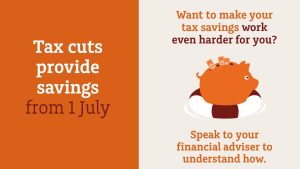Every parent wants to give their child the best start in life, even if that sometimes means footing the bill well into adulthood. Fortunately, with good financial planning, you can set your kids up for a bright (and independent) financial future, in just a few simple steps.
No two ways about it, raising a family is expensive. But did you know that some of the biggest costs come in later years, once your children reach high school and beyond?
The cost of tertiary education, buying their first car, or purchasing their first home often comes at a time when young people don’t have a large income of their own.
But what if you could help set up your kids to become financially independent right from the word go? Fortunately, it’s never too early, or too late, to put a financial plan in place for your kids.
Financial planning for families
In the early years, planning for your children’s future goes hand in hand with managing your own financial health and wellbeing. Putting a long-term financial plan in place will help you to:
- Set clear financial goals for your family.
- Create a family budget that can be adjusted as your needs change.
- Build your wealth; and
- Provide protection against unexpected or hidden costs.
You can create your own financial plan, although many families benefit from getting professional financial advice to help them reach their goals sooner.
Read more: Here’s how financial planning works
Investing for your children’s future
Once your own financial plan is in hand, you can start looking at strategies to build your kids’ financial freedom (and pay for some of those inevitable future expenses).
Like any investment strategy, the approach you choose depends on what you want to achieve, how long you’ve got and the level of risk you’re comfortable with.
Whether you’d like to chip in for uni fees in 10-years time, or gift your kids a share portfolio on their 21st birthday, a prudent approach to investing will give you access to your funds when you need them.
Here are some of the possible investment options you might want to consider:
Short investment timeline (e.g. less than three years)
When you only have a few years to reach your goal, you should avoid taking on too much risk. Cash savings are a good option in this situation. Make regular contributions to an interest bearing savings account, or even your mortgage offset account (you’ll reap the benefits of lower home loan interest). Just make sure to shop around for the best interest rates and look out for dedicated ‘kids’ accounts’ that offer special or bonus interest.
Medium investment timeline (e.g. 5-10 years)
With more time to ride out any market fluctuations, you can look at investments that offer higher returns in exchange for taking on more risk. The stock market is one such option and many parents are interested in starting a share portfolio for their kids.
There are several ways to invest in shares for your kids. Popular options include setting up a share portfolio with an online trading platform, or purchasing units in an Exchange Traded Fund (ETF). Some online trading platforms even offer specific accounts for children. Others allow you to act as a ‘trustee’ for the children’s shares, which means you’ll manage the portfolio until they’re old enough to take over.
Long investment timeline (10+ years)
Having ten or more years to invest increases your options considerably. As well as shares, parents can also consider investing in bonds or property. ‘Insurance’ bonds are sometimes used to invest for children or grandchildren, as they offer certain tax benefits when held for over 10-years. Whether they’re right for you will depend on your personal financial situation, so get expert advice.
Just remember, there are pros and cons, as well as tax implications to consider with every type of investment. So make sure to do your research thoroughly and always seek professional financial advice that’s tailored to your situation before investing. A financial planning professional can advise you on the right approach to reach your goals.
Read more: What’s the difference between a financial planner and an accountant?
Start financial education early
There’s certainly a lot to think about when it comes to planning for your children’s financial future.
Aside from investing on their behalf, one of the best things you can do for your children is teach them good money management skills from a young age.
Many of the decision making skills they’ll need to make good financial decisions are learnt in the first few years of life, so it’s never too early to start.
Learning how to prioritise your spending and save up for bigger purchases are all good habits that will help them manage their own money later on. Don’t forget to talk about debt either, as young people are especially vulnerable to accruing debt through in-app purchases, buy-now-pay-later services and credit cards.
The value of expert advice
A financial planning professional can help you create both a financial plan for your family and advise you on the best approach to secure your children’s financial future. If you would like to discuss this further call our office on 03 9562 0742.
This article was originally featured on Money and Life site, and can be accessed here.
Disclaimer: The views expressed in this publication are solely those of the author; they are not reflective or indicative of Financial Services Partners position and are not to be attributed to Financial Services Partners. They cannot be reproduced in any form without the express written consent of the author. The information provided in this document, including any tax information, is general information only and does not constitute personal advice. It has been prepared without taking into account any of your individual objectives, financial situation or needs. Before acting on this information you should consider its appropriateness,
having regard to your own objectives, financial situation and needs. You should read the relevant Product Disclosure Statements and seek personal advice from a qualified financial adviser. From time to time we may send you informative updates and details of the range of services we can provide. If you no longer want to receive this information please contact our office to opt out. Financial Services Partners Pty Ltd ABN 15 089 512 587, AFSL 237590







